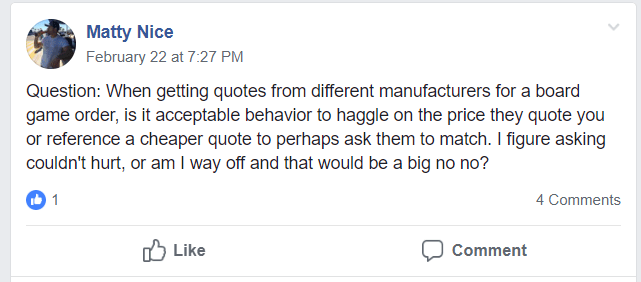I’m writing a quick post about why you should always get multiple quotes on board game manufacturing and negotiate with a few reputable companies because the question came up on Facebook:

I would argue that this advice extends beyond just your manufacturing into shipping and any other big projects you’re working on – even personal home improvement ones. The more quotes you have, the more educated you are about the project. That knowledge is going to help you effectively negotiate and make a decision. In short, negotiating on my last project saved me a little over $1 per unit which when you’re printing 10k+ copies of a game that definitely adds up.
Let me start off by saying that manufacturing your game should never be about going with the cheapest quote. There are also a lot of ways that vendors can cut corners and quote you a low price with cheaper cardstock, cardboard etc. if you’re not laying out the exact same specifications to everyone. It’s important that you’re comparing apples to apples before making your manufacturing decision. It’s also important that you get as much price breakdown as you can for each of your components since that will help you compare quotes as they come in. You can learn more about how to get quotes and manage the RFQ process from James Mathe’s excellent post here. Even if you’re comparing apples to apples as far as specifications go, you still may not want to go with the cheapest quote because there are a lot of other variables (reputation, shipping, communication, delays, quality, etc) that should inform you decision besides price.
With all that being said, let me give you a little anecdotal evidence as to why getting multiple quotes and negotiating will absolutely save you money. When you run a Kickstarter, especially a successful one, you will likely get contacted by manufacturers looking for your business. Don’t get me wrong, you should already have a quote in hand before you launch your Kickstarter to base your pricing on, but I suggest that you wait on negotiating until after your Kickstarter. Anyways, we were contacted by a handful of manufacturers during our Set a Watch campaign on Kickstarter. I handpicked a few of these companies (many of which I had already heard of) and took the quote from my manufacturer copy/pasted it into Excel and deleted the prices. This was my way of making sure I was comparing apples to apples because we had cardstock, box thickness, pictures of wooden components etc. all in the quote already.
When all of the quotes came in, I ended up with a wide array of quotes from Panda, LongPack, Whatz and Wingo games. I had one as cheap as $1.50 all the way up to just under $5. Interestingly, the manufacturer I have been using regularly was one of the more expensive. Now here is where negotiating and asking comes into play. I value my relationship with my manufacturer. I’ve never had any issue with their service, quality, timelines etc but no matter my business relationship when I’m presented with quotes that are lower (in some cases by more than 50%), I would be stupid not to either give these other companies a shot or at least give my existing project manager a chance to counter. These quotes were all from companies that other creators use and are listed on James Mathe’s blog: http://www.jamesmathe.com/hitchhikers-guide-to-game-manufacturers/.
Now some of you may be saying that Set a Watch was a very successful campaign and these companies were more aggressive on their quotes because of the size of the project. Maybe they were willing to cut into their profits a bit to get me as a customer, maybe the size of the print run gives them a lot more room to negotiate, etc. Yes of course the scale of your project helps and the more games you publish and the bigger your brand recognition the more negotiation power you will have. SCALE absolutely matters! With that being said, it’s not like I was pitting these companies against one another. The reality is that the more quotes you have the more educated you are about your project. No matter it’s size.
My negotiation on pricing wasn’t some cutthroat “Art of the Deal” bullshit. It was a simple email to my project manager at my manufacturer saying that I had gotten several other quotes with many being more than 50% cheaper than what they originally quoted me. I didn’t ask them to match the price, I just was honest and transparent and told them that with such a big price difference I couldn’t justify using them. In the end, they didn’t come down to the cheapest quotes I had received. They met me in the middle and came down a little over $1 per unit which ended up saving me over $10k. This kind of savings is huge for a small indie publisher like myself. It’s a budget for another game for me to make down the road. It’s another month or two of keeping the lights on. The moral of the story is it never hurts to ask and you don’t need to be some business guru or asshole to negotiate. Be true to yourself, but don’t let being a bit uncomfortable stop you from asking tough questions of your business partners and vendors.

Sporky Donkey (@Sporky_Donkey)
Thanks for the honest run down of your experience. Were there any red flags in your communications with manufacturers that turned you off using them?